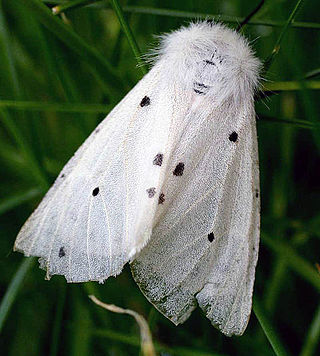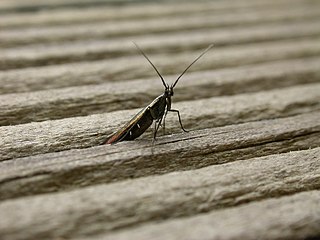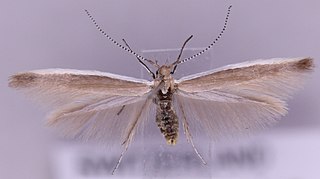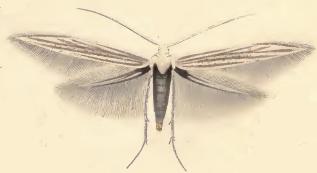
The ingrailed clay is a moth of the family Noctuidae. The species was first described by Johan Christian Fabricius in 1775. It is distributed through most of Europe and the Palearctic.

The small square-spot is a moth of the family Noctuidae. The species was first described by Karl Friedrich Vieweg in 1790. It is found in Europe apart from the far south-east then east through the Caucasus, Transcaucasia, Central Asia, Siberia, the Russian Far East and Kamchatka.

The Coleophoridae are a family of small moths, belonging to the huge superfamily Gelechioidea. Collectively known as case-bearers, casebearing moths or case moths, this family is represented on all continents, but the majority are found in temperate areas of the Northern Hemisphere. They are most common in the Palearctic, and rare in sub-Saharan Africa, South America, and Australia; consequently, they probably originated in northern Eurasia. They are relatively common in houses, they seek out moist areas to rest and procreate.

Coleophora is a very large genus of moths of the family Coleophoridae. It contains some 1,350 described species. The genus is represented on all continents, but the majority are found in the Nearctic and Palaearctic regions. Many authors have tried splitting the genus into numerous smaller ones, but most of these have not become widely accepted.

Blepharopsis mendica is a species of praying mantis found in North Africa, parts of the Mediterranean, Middle East and southern Asia, and on the Canary Islands, and the sole member of the genus Blepharopsis. Egyptian flower mantis, thistle mantis, and Arab mantis are among its common names.

Diaphora mendica, the muslin moth, is a moth of the family Erebidae. It is found in the Palearctic realm east to Lake Baikal.

Coleophora serratella is a moth of the family Coleophoridae. It is found in Europe, Japan (Hokkaido) and North America.

Coleophora limosipennella is a moth of the family Coleophoridae described by Philogène Auguste Joseph Duponchel in 1843. It is found in Europe from Fennoscandia to the Pyrenees, Italy and the Balkan Peninsula and from Great Britain to the Baltic States and Romania. It is an introduced species in North America.

Protolampra sobrina, the cousin german, is a moth of the family Noctuidae. The species was first described by Philogène Auguste Joseph Duponchel in 1843. It is found in most of Europe, then east across the Palearctic to Siberia, Altai, Irkutsk, Kamchatka and Korea.

The clover case-bearer or small clover case-bearer is a moth of the family Coleophoridae. It is native to Asia, Europe and North Africa, and has been introduced to Australia and New Zealand.

The metallic coleophora moth is a moth of the family Coleophoridae. It is native to Europe and Armenia, but is an adventive species in the Nearctic realm, where it is found throughout the United States and southern Canada. It has also been recorded from New Zealand, Chile and Argentina.

Coleophora albicostella is a moth of the family Coleophoridae. It is found from Latvia to the Iberian Peninsula, Italy, Greece and Cyprus.

Coleophora colutella is a moth of the family Coleophoridae. It is found in all of Europe, except Great Britain and Ireland. It is an introduced species in North America.

Coleophora ledi is a moth of the family Coleophoridae. It is found from Fennoscandia and northern Russia to the Pyrenees and the Alps. In the east, it ranges to Japan. Outside of Eurasia, it is known from North America where it is found in eastern Canada, Michigan, and Alaska.

Coleophora millefolii is a moth of the family Coleophoridae. It is found in most of Europe, except Great Britain, Ireland and the Iberian Peninsula.
Coleophora dianthi is a moth of the family Coleophoridae. It is found in most of Europe, Russia, Turkey and Iraq.
Steniodes mendica is a moth in the family Crambidae. It was described by W. von Hedemann in 1894. It is found in Cuba, Jamaica, Puerto Rico, the Virgin Islands and Grenada, Costa Rica, Honduras, Mexico and the United States, where it has been recorded from Florida to Texas.

Catorhintha mendica is a species of leaf-footed bug in the family Coreidae. It is found in North America.












